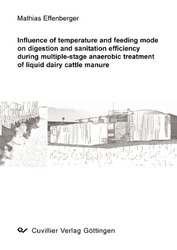| Areas | |
|---|---|
| Serie de libros (97) |
1381
|
| Nachhaltigkeit |
3
|
| Gesundheitswesen |
1
|
| Letra |
2370
|
| Ciencias Naturales |
5407
|
| Matemática | 228 |
| Informática | 319 |
| Física | 980 |
| Química | 1364 |
| Geociencias | 131 |
| Medicina humana | 243 |
| Estomatología | 10 |
| Veterinaria | 108 |
| Farmacia | 147 |
| Biología | 835 |
| Bioquímica, biología molecular, tecnología genética | 121 |
| Biofísica | 25 |
| Nutrición | 45 |
| Agricultura | 1005 |
| Silvicultura | 201 |
| Horticultura | 20 |
| Ecología y conservación de la tierra | 148 |
| Ciencias Ingeniería |
1798
|
| General |
98
|
|
Leitlinien Unfallchirurgie
5. Auflage bestellen |
|
Erweiterte Suche
Influence of temperature and feeding mode on digestion and sanitation efficiency during multiple-stage anaerobic treatment of liquid dairy cattle manure (Tienda española)
Mathias Effenberger (Autor)Previo
Indice, Datei (34 KB)
Lectura de prueba, Datei (71 KB)
This work deals with the evaluation of the performance of a multiple-stage anaerobic digestion process with respect to the degradation of organic matter and the inactivation of pathogenic and indicator organisms in liquid dairy cattle manure. Investigations were performed at bench- and full-scale.
During the three-stage mesophilic-thermophilic-mesophilic anaerobic treatment of liquid manure from cattle receiving a high-fiber diet, a comparably high methane yield of 0.24 m3 per kg of volatile solids was achieved. Given a minimum guaranteed retention time of 4 h at 55°C, the level of fecal coliforms in liquid manure was reduced to below 10 MPN per g fresh matter. The concentration of infectious oocysts of Cryptosporidium parvum was reduced by more than 5 log-units. Increasing the feeding interval from 1 to 4 h had no significant influence on the performance of the system. When the temperature in the first treatment stage was decreased from 38 to 20-25°C, the process stability in the thermophilic reactor was significantly improved while overall the methane yield and the reduction of indicator organisms remained essentially unchanged.
Based on these findings, two-stage thermophilic-mesophilic anaerobic digestion can be approved as a treatment technology for liquid manure to minimize the input of pathogenic and indicator organisms from livestock farming into the environment.
| ISBN-10 (Impresion) | 3867276528 |
| ISBN-13 (Impresion) | 9783867276528 |
| ISBN-13 (E-Book) | 9783736926523 |
| Formato | A5 |
| Idioma | Inglés |
| Numero de paginas | 144 |
| Laminacion de la cubierta | Brillante |
| Edicion | 1 |
| Volumen | 0 |
| Lugar de publicacion | Göttingen |
| Lugar de la disertacion | München |
| Fecha de publicacion | 25.07.2008 |
| Clasificacion simple | Tesis doctoral |
| Area |
Agricultura
|
| Palabras claves | Anaerobe Behandlung; Biogas; Gülle; Milchvieh; Krankheitserreger; Indikatororganismen; mesophil; thermophil; Kryptosporidien |








